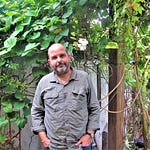→ Press play to listen to my conversation with journalist João Villaverde about Julián Fuks’ work (in Portuguese).
→ Aperte o play para escutar a minha conversa com o jornalista João Villaverde sobre a obra de Julián Fuks.
The newsletter can be read in English or Portuguese. For the Portuguese version, scroll down.
A newsletter pode ser lida em inglês ou português. Para a versão em português, arraste para baixo.
English Version
Julián Fuks’ books invite me to think about my parents’ lives prior to my existence. As I write this essay, I look at the old family pictures my mom sent us last week. A young version of my dad in a striped shirt and full blown curly hair sits at a restaurant saying something to whomever held the camera. My mom - whose younger version is my doppelganger - looks at the camera while my grandfather passes through the kitchen. There is also a photo of a living room in their house that I never knew (or of which I have no recollection).
Their singular appearance in the photograph is a culmination of former paths. (“Resistance”)
The paths my parents have taken brought them to a place that is very different from the one in which I stand. I see authoritarianism in Brazil’s current president; it seems they see hope. Contrary to Fuks’ parents, mine have no background in political activism. They were both born in poor areas of São Paulo and entered the Brazilian middle class through hard work. The climbing (and the children) kept them busy. Perhaps the most radical act I’ve seen from them was my dad’s foray into poetry. I felt wonder when I found a book with one of his poems that had been hidden away in a room. This particular poem was about the problems of modernity and consumerism. Where did this version of him go?
The fear that almost all fascism takes advantage of, too, the fear of something uncertain, mythical, an enemy erected and sculpted with great care. (“Occupation”)
As I ask myself this question, I think about the above passage in Fuks’ book. I have long tried to understand how my world view can be so different from my parents’ if I’m partly a product of them. I think Fuks gets at something very important here: fascism takes advantage of a fear of the other. Because of the dire circumstances in which they were born, my parents spent their life strongly protecting all they built from anything that could ruin it. It’s their life's work, after all. They fear something that I’m not sure I fully understand. Communism - even though the evidence that points to its non-existence in Brazil (at any point in history) is abundant. I, on the other hand, never carried the weight of having to protect a life structure like they did. Life was always lighter to me because they did the initial heavy lifting.
The fact is, I just got tired of being occupied, by men, by rats, by maggots. Now it’smy turn to occupy, don’t you think? Rosa, my name’s Rosa. (“Occupation”)
It is this lightness that allows Rosa’s story to bring me to tears. Of all I’ve read from Fuks, this is what touched me the most: the story of a woman who has been occupied by men, by rats, by maggots, whose exhaustion from not being able to occupy her own place in the world brings her to occupy an abandoned building in São Paulo. This is a prime example of Fuks’ “occupied literature”, of which I wrote in my last essay. He leaves his own story to give space to Rosa, whose story must be told.
No, my parents’ political history has no epilogue. The outlines of their non-conformism are more discreet and at the same time clearer: their militancy always manifested itself in a habit of questioning, challenging, arguing. (...) I would never want to hold a weapon in my hands, and saying that is itself also a form of action, it too forms part of a political history. (“Resistance”)
However different our parents are, Fuks also diverges from his: he would never hold a weapon in his hands (like his parents did). Writing seems to be his own form of resistance. I am glad he chose that route. It was through his writing that I was able to face the inability to place myself in relation to my parents. I talk to them. I try to show them what the research says. I attempt to show them the facts. Sometimes they listen, sometimes they don’t. But as my mom likes to say, it doesn’t really matter because her life has had another purpose. Politics is not for her. At the end I’m just taken by a deep feeling of gratitude. They did the initial lifting. I’m where I’m in history - I’m able to argue, question, challenge - because I feel light enough to do so. Resistance worked its way through me.
Versão em Português
Os livros de Julián Fuks me convidam a pensar sobre a vida dos meus pais antes da minha existência. Escrevo este texto olhando para as fotos de família antigas que minha mãe mandou na semana passada. Uma versão mais nova do meu pai com cabelo cacheado e vestida em uma camisa listrada está sentada em um restaurante dizendo algo a quem segura a câmera fotográfica. Minha mãe - cuja versão jovem é minha doppelganger - olha para a câmera enquanto meu avô passa pela cozinha. Também há uma foto de uma sala de estar em uma casa que nunca conheci (ou da qual não tenho nenhuma lembrança).
Sua aparição pontual na fotografia é uma culminação de caminhos pretéritos. (“A Resistência”).
Os caminhos trilhados pelos meus pais levaram-nos para um lugar que é muito diferente daquele no qual me encontro. Eu vejo autoritarismo no atual presidente do Brasil; eles parecem enxergar esperança. Ao contrário dos pais de Fuks, os meus não têm experiência com ativismo político. Os dois nasceram em regiões pobres de São Paulo e entraram para a classe média através de muito trabalho. A ascensão e as crianças deixaram-nos ocupados. Talvez o ato mais radical que tenha visto por parte deles foi a incursão do meu pai pela poesia. Fiquei maravilhada quando encontrei um livro com um poema dele escondido em um quarto de nossa casa antiga. Este poema específico tratava dos problemas da modernidade e do consumismo. O que aconteceu com essa versão dele?
O medo de que se aproveita também quase todo fascismo, o medo de algo incerto, mítico, de um inimigo erguido e esculpido com esmero. (“A Ocupação”)
Ao me fazer esta pergunta, penso sobre a passagem acima do livro de Fuks. Há muito tempo tento entender como a minha visão de mundo é tão diferente da dos meus pais se sou, em parte, produto deles. Acho que Fuks toca em algo muito importante aqui: o fascimo se aproveita do medo do outro. Por conta das circunstâncias precárias nas quais meus pais nasceram, eles passaram a vida protegendo tudo o que construíram com unhas e dentes. Afinal de contas, é o trabalho da vida deles. Eles têm medo de algo que eu não sei se entendo bem. Comunismo - mesmo diante de tantos indícios que apontam a inexistência de tal regime no Brasil (em qualquer momento da história). Eu, por outro lado, nunca carreguei o peso de ter de proteger uma estrutura de vida, como eles fizeram. A vida sempre foi mais leve para mim porque eles tomaram para si a tarefa pesada de me levantar.
O caso é que eu cansei de ser ocupada, por homem, por rato, por larva. Agora é a minha vez de ocupar, você não acha? Rosa, meu nome é Rosa. (“A Ocupação”)
É essa leveza que me permite chorar ao ler a história de Rosa. De tudo que li de Fuks, este trecho foi o que mais me tocou: a história de uma mulher que foi ocupada por homens, ratos, vermes, cujo cansaço por não poder ocupar seu próprio lugar no mundo faz com que ela ocupe um prédio abandonado em São Paulo. Este é um exemplo excelente da “literatura ocupada” de Fuks, sobre a qual escrevi na última newsletter. O autor deixa a sua própria história para dar espaço a Rosa, cuja história precisa ser contada.
Não, não tem um epílogo a história política dos meus pais. Seu inconformismo tem contornos mais discretos e a um só tempo mais nítidos: sua militância sempre se manifestou no hábito de questionar, disputar, discutir. (...) Jamais quereria ter uma arma nas mãos, e dizê-lo é também uma ação, também constitui uma história política. (“A Resistência”)
Por mais diferentes que nossos pais sejam, Fuks também diverge dos seus: ele nunca seguraria uma arma nas mãos (como seus pais fizeram). A escrita parece ser sua forma de resistência. De minha parte, fico feliz por ele ter escolhido esse caminho. Foi através do texto dele que consegui enfrentar a incapacidade de me situar em relação aos meus pais. Falo com eles. Tento mostrar o que a evidência científica diz. Tento ressaltar os fatos. Algumas vezes eles me ouvem, outras não. Mas como minha mãe gosta de dizer, não faz diferença porque a vida dela teve outro propósito. A política não é para ela. No fim, eu sou tomada por um sentimento de gratidão profunda. Meus pais me deram o empurrão inicial. Estou onde estou na história - sou capaz de argumentar, questionar, desafiar - porque me sinto leve o suficiente para fazer isso. A resistência abriu caminho através de mim.
Essa newsletter é produzida em parceria com o Espaço Rasgo, uma casa de cultura que promove a arte, o conhecimento, e o debate.












Notes on the self and the other | Notas sobre o eu e o outro